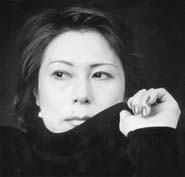Natsuo Kirino
Interviewed by Andrew Duncan
|
Natsuo Kirino began her career in 1984 as a romance novelist, but established herself as a daring and groundbreaking mystery author during the early 1990s. Out, the recipient of Japan's top mystery award in 1998, is her first work to be published in English.
|
Day after day, four women -- Masako, Yoshie, Kuniko, and Yayoi -- work the demanding and tedious late shift at a local boxed lunch factory. But their relentlessly moribund and dreary lives take a strange turn when Yayoi murders her deadbeat husband in a fit of rage, and turns to her coworkers for help in covering up the crime.
Little do the women know that aiding Yayoi will open up some grisly and irresistible opportunities...while also putting their lives in serious jeopardy.
Unpredictable, disturbing, merciless, violent, and hypnotic, Out is both an unforgettable depiction of modern Japan, and an impressive introduction to one of Japan's foremost mystery authors: Natsuo Kirino.
BookSense.com: You began your career as a romance novelist...so what initially attracted you to writing about crime?
Natsuo Kirino: As a romance novelist, I could not make a living because there was no market for the genre in Japan. Also, romance novels weren't really what I wanted to do as a writer. I'm fascinated by the psychological aspects of crime. When a person is cornered, they do unimaginable things -- things that one usually thinks they would never do. And there is this single moment where a person becomes susceptible to committing a crime. To delve into these things is to explore the whole of human psychology.
What inspired Out?
I have many friends who are homemakers or housewives, and they are financially helpless because they depend so much on their husband's incomes. It is very difficult for them to see that they have their own lives.
One of my friends confessed to me she was bankrupt because she secretly overused her husband's credit card. By any standard, this woman is a good wife, a good mother, and a model housewife. She does not look like the type of person who would do something like that. With Out, I wanted to write about a human being going into that sliver of a moment when anything becomes possible.
How are the main female characters in Out representative of the contemporary Japanese woman?
I didn't set out to make four separate cases -- these women just happened to work together in the bento box factory. However, it ended up being something like this:
Masako is a symbol of Japanese women who cannot be promoted in society. As a female accountant, she could not climb the corporate ladder, and now she has a blue-collar job.
Kuniko overused her credit cards, and became bankrupt. She represents the rampant consumerism Japan went through during this economic bubble where people were overwhelmed with desire, and were out of control with their finances.
Yoshie lives in poverty, and is also taking care of her ailing mother-in-law. Yayoi is the typical housewife within the family -- always less important than the man. They are both very representative of the common Japanese woman of today. They carry so much responsibility on their shoulders, and their roles are so clear: men exist outside of the house, and women stay in the house.
What was the critical and popular reaction to Out in Japan?
Everybody was very shocked. It was a controversial work, and because of that it sold very well. There were some reproaches against me. Some people didn't like my work. And of course, there were lots of people who praised me: "Oh, you have written such a good book."
It was a mess.
What reaction surprised you the most?
Men were very shocked that a wife could kill her husband. That was really a provocative idea. Japanese men felt so threatened by it. They also never imagined that a woman could write such an aggressive novel. The most shocking part of Out for a lot of people is that it's written by a married woman who has a family and a child. If the book was written by a man, people wouldn't be as surprised, and they'd look at it as fiction. But because a woman wrote it and it's realistic to a certain degree, people were surprised.
Your novel and many Japanese films from the last few years depict contemporary Japan as an unsettled society whose outward calm masks an underlying current of severe physical and psychological violence. Is this the case?
The old family system is collapsing more and more. Although the division between men and women remains -- men still go out and women still stay in -- a man now cannot sustain the entire family. We have reached the point where women have to put the children into childcare so that they can work to help support the family, too. Then, the children themselves are under extreme educational pressure. So everybody is making the best effort to sustain him or herself. It is a very confusing time for our society. I have the feeling that people don't know what to do to get out of their situations.
Do you think this is creating a culture of violence?
Some of the violence depicted in the media is a metaphor for frustration, but there are more and more cruel crimes happening -- and the people who commit these hideous crimes are getting younger and younger. A few years ago, there were a lot of crimes committed by young women. Now it's kids murdering people. Japanese adults are completely astounded, and don't know what to do. That's the reality that we are getting into, and it is getting worse.
Do you see any solution?
I don't know. All I can do as a writer is express a more realistic depiction of this reality.
What writers have influenced you?
Flannery O'Connor is my favorite American author. But these days, I am very focused on my own work, so I don't get that much inspiration from other writers.
What have you been reading lately?
I'm researcing material for a project on Manchukuo, a puppet state the Japanese ran in northeast China from 1932-1945.


